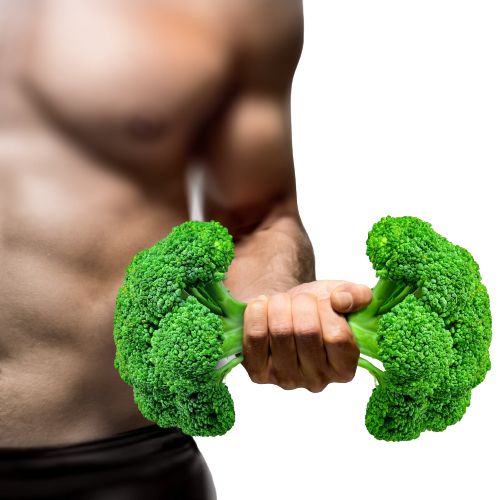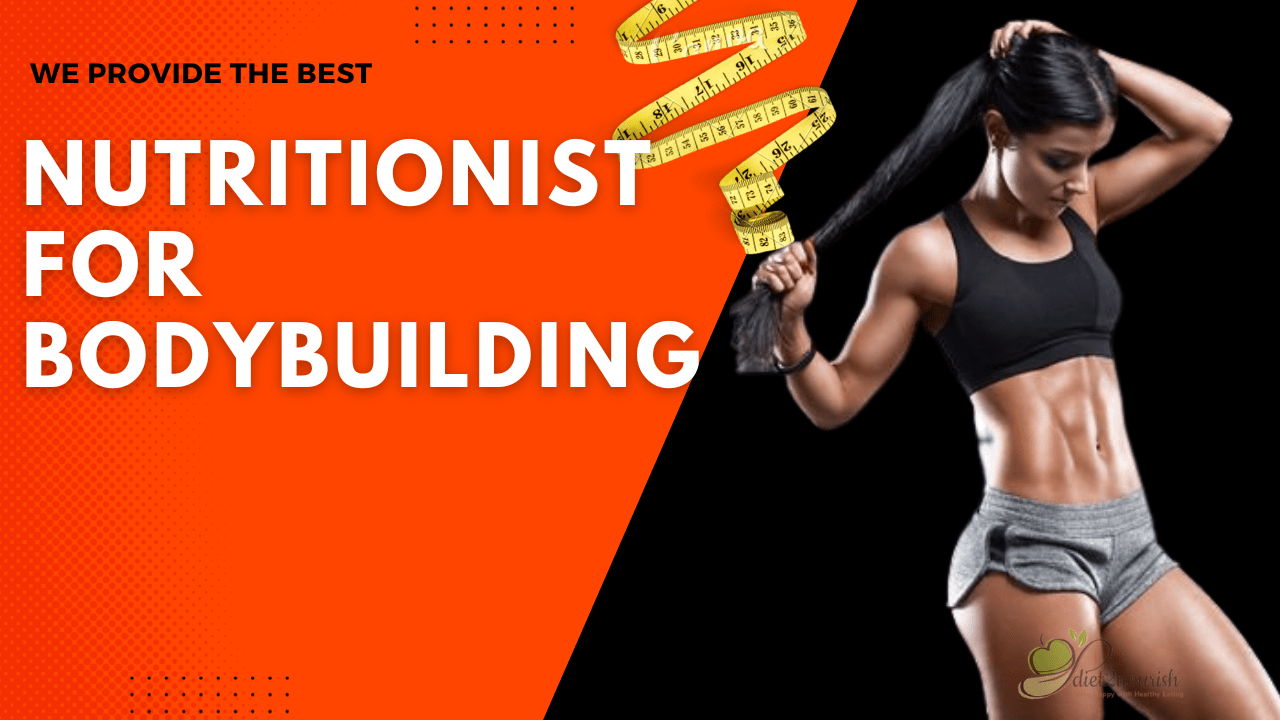Nutritionist for Bodybuilding
Are you trying to find the top Indian nutritionist for bodybuilding? You are on the correct page if your response is YES.
Planning your nutrition is essential for maximizing your bodybuilding results, regardless of whether you compete or just do it for fun. This is where we can help with plans developed just for you based on your health goals.
Whether you engage in bodybuilding for fun or competition, it is a way of life. To develop the muscles in your body, weightlifting, and diet are required. Your bodybuilding lifestyle depends on how much time you spend inside and outside the gym. A bodybuilder nutritionist is the best resource when selecting a diet plan.
What are the Benefits of Bodybuilding?
In contrast to powerlifting or Olympic lifting, bodybuilding emphasizes a competitor’s outward appearance more than their physical prowess. As a result, bodybuilders strive to achieve and maintain a lean, muscular, well-balanced physique.
- Bodybuilding has a number of positive health effects.
- Bodybuilders frequently work out to keep their muscles toned and growing, engaging in resistance and aerobic training.
- The strength and size of muscles are increased by resistance exercise. Muscle strength is associated with a lower risk of dying from serious illnesses like cancer, heart disease, kidney disease, and other similar conditions.
- Cardiovascular health is improved, and your chance of developing or passing away from heart disease, the leading cause of death in America, is considerably decreased by aerobic exercise, which bodybuilders frequently do to reduce body fat.
- Bodybuilders put a lot of emphasis on their diets and workouts.
- Bodybuilders can eat in a way that supports their efforts in the gym and keeps them healthy with careful preparation.
- Your risk of developing chronic diseases can be considerably reduced by adopting a healthy eating pattern that includes nutrient-dense meals from all food groups in the recommended serving sizes.
- Regular exercise and nutrient-dense diets, both of which offer many health benefits, are common among bodybuilders.
What are the Dietary Requirements for Bodybuilding?
Bulking and cutting are the two main phases of bodybuilding exercise and diet. Building muscle is the aim of the bulking phase while maintaining muscle while lowering body fat is the aim of the cutting phase.
- A cutting diet emphasizes nutrient-dense, lower-calorie foods to encourage fat reduction, while a bulking diet emphasizes nutrient- and calorie-dense foods to encourage muscle development.
The intake of Calorie & Macronutrients in these two phases:
1. Calorie Intake
For competitive bodybuilders, the two main objectives are increasing muscle mass during the bulking phase and lowering body fat during the cutting phase. As a result, you consume more calories during the bulking phase than during the cutting phase.
2. Other Macronutrients
Once you have determined how many calories you require, you can calculate your macronutrient ratio, which is the proportion of protein, carbohydrates, and fats that you consume. Your macronutrient ratio does not alter, unlike the difference in calorie requirements between the bulking and reducing phases.
Importance of Consuming the Right Diet
- Your muscles get the nutrients they need from the proper foods in the right amounts to recuperate from workouts and develop into bigger, stronger muscles.
- On the other hand, eating the incorrect foods or not enough of the correct ones would result in inferior outcomes.
- It is suggested to stay connected with your nutritionist for bodybuilding before beginning an extreme bulk or cutting diet, as with any significant change to your diet or workout routine.
Not only this, but your nutritionist for bodybuilding will include a variety of nutrient-rich foods in your diet from each food group. And your nutritionist will keep an eye on your daily intake and limit your consumption of alcohol, fried foods, and foods with added sugars. You might need supplements like Whey protein, creatine, and caffeine, which are beneficial in addition to your diet.
Can I build muscle without a nutritionist’s help?
Reaching your muscle-building objectives requires nourishing your body with a variety of nutrient-dense foods, particularly protein, and carbs. Speak to a certified sports nutritionist or registered dietitian if you need assistance creating a meal plan that will promote muscle building.
What is the role of a nutritionist in bodybuilding?

Bodybuilding training and dieting are divided into two phases: bulking and cutting. Bodybuilders exercise regularly and may eat well-planned and nutrient-dense diets, which offer many health benefits. Sometimes, people think only a gym instructor or a senior bodybuilder is enough to become a bodybuilder. But do you know it is a partial truth? Yes, the following are the reasons to connect to a nutritionist for bodybuilding. And you will see how the best bodybuilding nutritionist in India can make your journey easier than you think.
1. Fulfill all your dietary requirements
Bodybuilding is extremely physically demanding, requiring a highly nutritional diet to fulfill dietary requirements. Consulting a nutritionist for bodybuilding will help you with a personalized diet plan that will energize you for longer.
A nutritionist understands that your diet includes nutrient-dense foods and plenty of protein with each meal and snack and restricts alcohol and deep-fried or high-sugar foods. Many bodybuilders, especially those at the beginning of their journey, develop unrealistic expectations of what they can accomplish naturally, which may lead to body dissatisfaction and, eventually, the urge to try anabolic steroids.
2. You can ditch fad diets now -thanks to them
An experienced nutritionist will examine your daily eating patterns to identify any problem areas if weight loss is your objective. They will obtain a thorough health history to find dietary deficiencies and other general health problems. This enables a qualified dietician to create a meal plan tailored to your nutritional needs.
3. A significant pillar to keep you responsible
Weekly check-ins are necessary for a qualified nutritionist for bodybuilding to keep you accountable. We’ll check your weight and meal logs to ensure you’re on track. When they are held responsible for their actions, most people do better. You can also express worries about what you can eat at an upcoming party or other food-related occasion or ask about your usual diet during this period.
4. They will resolve your “information overload” issues
The most frequent inquiries nutritionists receive are: “Should I stay away from carbs?” Are fats harmful? likewise, “How do I choose which supplements to take?” A qualified dietitian can provide the solutions to these and other questions. Additionally, he or she can identify any dietary deficits and provide the appropriate vitamins. It can be daunting to enter a vitamin store without knowing what you’re searching for.
5. They will help you get your desired physical outcomes
An experienced nutritionist can assist you in setting objectives and guiding you towards achieving those objectives, whether you want to run a marathon, gain more muscle, lean out, or get ready for a competition. Additionally, he or she may advise specific vitamins to aid in your quest for the ideal appearance.
How can Nutritionists for Bodybuilding manage the side effects of supplements?

We are all aware of the benefits of exercise on our health. One could attempt different “bodybuilding supplements” out of desperation, excessive zeal, expectations of instant results, peer pressure, and unrealistic goals. Consumption of supplements in the field of bodybuilding has quite common now. This can affect your body in a negative. However, being in touch with a nutritionist for bodybuilding can educate you about these side effects and suggest even unharmful ways. A nutritionist for bodybuilding will guide you through the diet with no side effects, and you can still manage to gain muscle & fulfill your desired goal.
The Side Effects of Supplements can include:
- The users, specifically bodybuilding items, muscle-building compounds, anabolic steroids, and anabolic medications, include testosterone and other androgens, aromatase inhibitors, HCG, phosphodiesterase inhibitors, etc.
- These can be the causes of hormone misuse in growth. The body’s natural testosterone axis is suppressed, and males may experience gynecomastia or abnormal breast growth.
- Women can have male pattern voice development, hair fall on the scalp, excessive face and body hair, acne, greasy complexion, infertility concerns, and irregular menstrual cycles.
- Heart attacks and brain strokes brought on by high cholesterol levels, as well as liver and kidney damage, heart issues, abnormal clotting tendencies, short teenage stature, infections, elevated blood sugar, acne, greasy skin, low sperm counts in men, masculinization of women, and issues with sex life.
The Bottom Line
One of the best preventative healthcare actions you can do is to consult a nutritionist for bodybuilding. A nutrition expert provides much more than simply calorie data. They are highly knowledgeable about how the body works, the foods needed for peak performance, and the best ways to prevent or delay the onset of specific health problems like diabetes, high blood pressure, and obesity, to mention a few.
Restrictive eating patterns come and go and are frequently not ideal for gaining muscle. Reaching your muscle-building objectives requires nourishing your body with a variety of nutrient-dense foods, particularly protein, and carbs. Speak to a certified nutritionist for bodybuilding or a registered dietitian if you need assistance during your journey toward bodybuilding.
Frequently Asked Questions (FAQs):
How can men gain weight with diet and gym?
Answer:
Doing weight training exercises along with an appropriate diet can help men to put on weight. Having food high in protein helps in building muscle mass. You can also choose food rich in carbohydrates for weight gain while hitting the gym.
Furthermore, consuming more calories than your body needs can help support weight gain. Therefore, you can eat food high in calories to gain weight.


